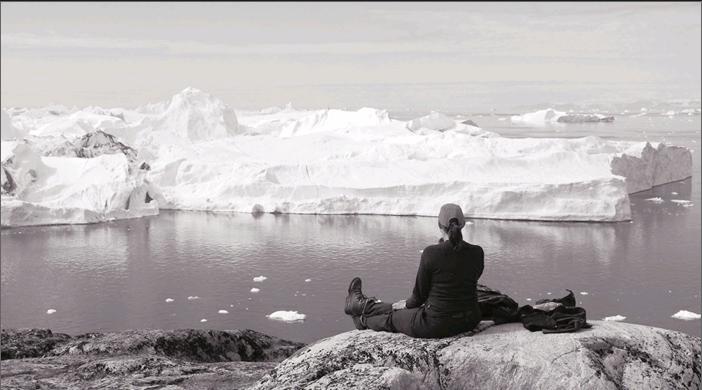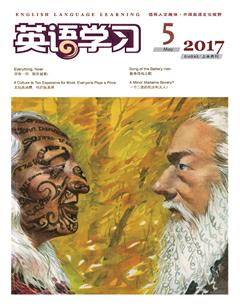给未来的自己
By+Steve+Gardiner

When Charles Lee handed me the small red notebook in 1974, he changed my life. “While you are traveling, you should keep notes on the things you see and do,”he explained.
I was 20 years old, a junior in college, spending a semester at the University of London. Charles was a retired traveling salesman. I was staying with him in his cottage in Kendal, located in the Lake District of northern England.1 It was a one-week homestay2 the university arranged for us before classes began.
“You are young and doing a lot of exciting things,” Charles said. “It seems as though you will always remember these things, but I promise, you will forget them if you dont write them down.”
I took his advice. I wrote in the notebook every day during the homestay. Back in London, I recorded weekend trips to Wales,Yorkshire,3 France, and Spain. I commented on my classes, professors, and classmates. I contrasted my life at a small college in western Nebraska with my wandering through the streets of London, my introduction to life in a big city, my initial travels outside the United States.4 I tracked5 ideas I had about my life and my future.
When I wrote in the notebook, I struggled with a sense of my audience and purpose. Who would read this? Were these writings just for me, or did I want others to read them? Was I recording events and ideas just as a prompt6 to memory, or was there some larger purpose for this daily exercise?
I developed a sense of vision7 for the task. I was recording events, thoughts, words that were important to my life. I imagined a future me sitting down to read the pages. I wondered what it would feel like to read those words later. I wondered where I would be, what my life would be like.
I filled the notebook Charles gave me. I bought a new one and filled it. Then another and another. I continued writing in notebooks for four decades. By that time, they filled two boxes in my garage.
I had reread some of the journals. Specific volumes had provided me with the background I needed for dozens of articles for magazines and newspapers.8 But I had never read them all.
Recently, I decided to bring my collection of notebooks into my office and replay my life. As I opened the first box, I suddenly became nervous. Would I like the former me portrayed on those pages? There was a risk in opening that first notebook. I did it anyway.
Charles had been right. I remembered the big events, the central happenings, but on each page were details I hadnt retained9.
The pages revealed highlights from college classes and stories about roommates and friends.10 I read anxious comments Id written as Id launched my teaching career, learned to write lesson plans, assigned grades for student work, and solved discipline problems.11 I reflected on my coming marriage, then the wedding, and eventually the proud moments when I held each of our three daughters. I recounted more trips—returning to Europe, teaching in South America, taking a photo safari in Africa, exploring Greenland.12 I relived memories of trails hiked, rivers paddled13, mountains climbed, dreams shared.
The writings in those journals framed14 my life. I hadnt written every day. I often skipped a few days or even weeks, but I always picked up the writing when it felt important. Journals went with me when I traveled, and I often wrote in them at school when my own students were writing. I modeled the behavior I wanted my students to perform.15 I encouraged them to keep journals of their own, passing on the lesson Charles had given me.
These writings formed a continuous thread through events in my life, a connection between my own past, present, and future.16 They gave me the chance to record my life, sort out17 my thoughts and emotions, play with ideas, see patterns and themes in my experience, decide what was important to me and what was not.
It took several long evenings to read through the notebooks, taking me on a retrospective tour spanning 42 years.18 As I read, I could recall sitting on a bench in Trafalgar Square in London, in our apartment in Peru, on a mountaintop in Wyoming,19 writing to the future me. It was then I realized: I am now the person I was writing to throughout those years.
1. cottage: 鄉村小屋;Kendal:肯德尔,是英格兰湖区南部的一个小镇;Lake District: 英格兰湖区,位于英格兰西北海岸,因其湖光山色和湖畔诗人(尤其是华兹华斯)而闻名。
2. homestay: 寄宿家庭,为外国留学生提供住房和基本生活设施的服务。寄宿家庭在发达国家已经有很长时间历史,主要是为了帮助外国留学生解决住宿问题,提高外语水平,更好地融入当地社会。
3. Wales: 威尔士,位于英国西南部,东临英格兰;Yorkshire: 约克郡,位于英格兰东北部,是英国重要的文化之乡。
4. 我在伦敦街头漫无目的的闲逛、我第一次在大城市中的生活以及我走出美国的最初几次旅行——我把当下的生活与之前在内布拉斯加州西部一所很小的大学中的生活做了对比。Nebraska: 内布拉斯加州,美国中西部大平原区的一个州。
5. track: 跟踪(表现或进展情况)。
6. prompt: 提示,提醒。
7. vision: 构想,远见。
8. 某几本特定的日记还为我的数十篇报刊投稿提供了所需的背景材料。volume:(书的)一本,一册。此处指代作者这些年来写满的很多个日记本。
9. retain: 记住。
10. reveal: 展现,显露;highlight:最突出(精彩)的场面。
11. 我读着自己刚刚步入教师行列时写下的种种焦虑:学习写教学计划、给学生作业打分,还有解决纪律问题。launch: 开始从事;assign: 分配,分派。
12. recount: 叙述,描述;safari:(尤指在非洲的)野外观兽旅行;Greenland: 格陵兰,全境大部分在北极圈内,气候寒冷,隔海峡与冰岛和加拿大两国相望。
13. paddle: 用桨划(小船)。
14. frame: 勾画。
15. 我为了教育自己的学生而以身作则。
16. 如同一条连绵的线,这些文字将我的一生串连起来,系起我的过去、现在和未来。
17. sort out: 整理,梳理。
18. 我花了几个晚上翻看这些日记直到深夜,完成了一次跨越42年的人生回顾。retrospective: 涉及以往的,回顾的;span: 持续,贯穿。
19. Trafalgar Square: 特拉法尔加广场,英国伦敦著名广场,名胜之一;Peru: 秘鲁,南美洲西部的一个国家;Wyoming: 怀俄明州,位于美国西部落基山区。

